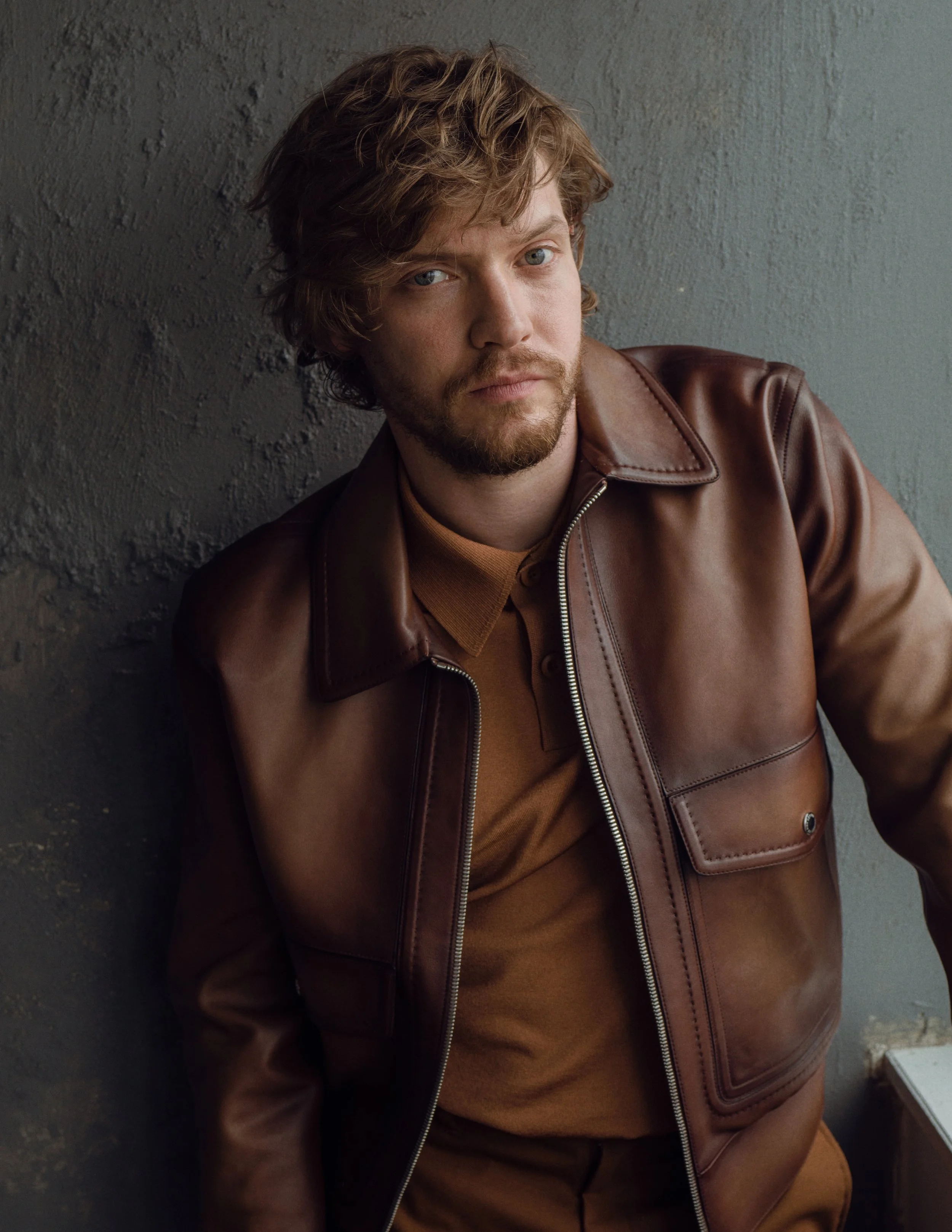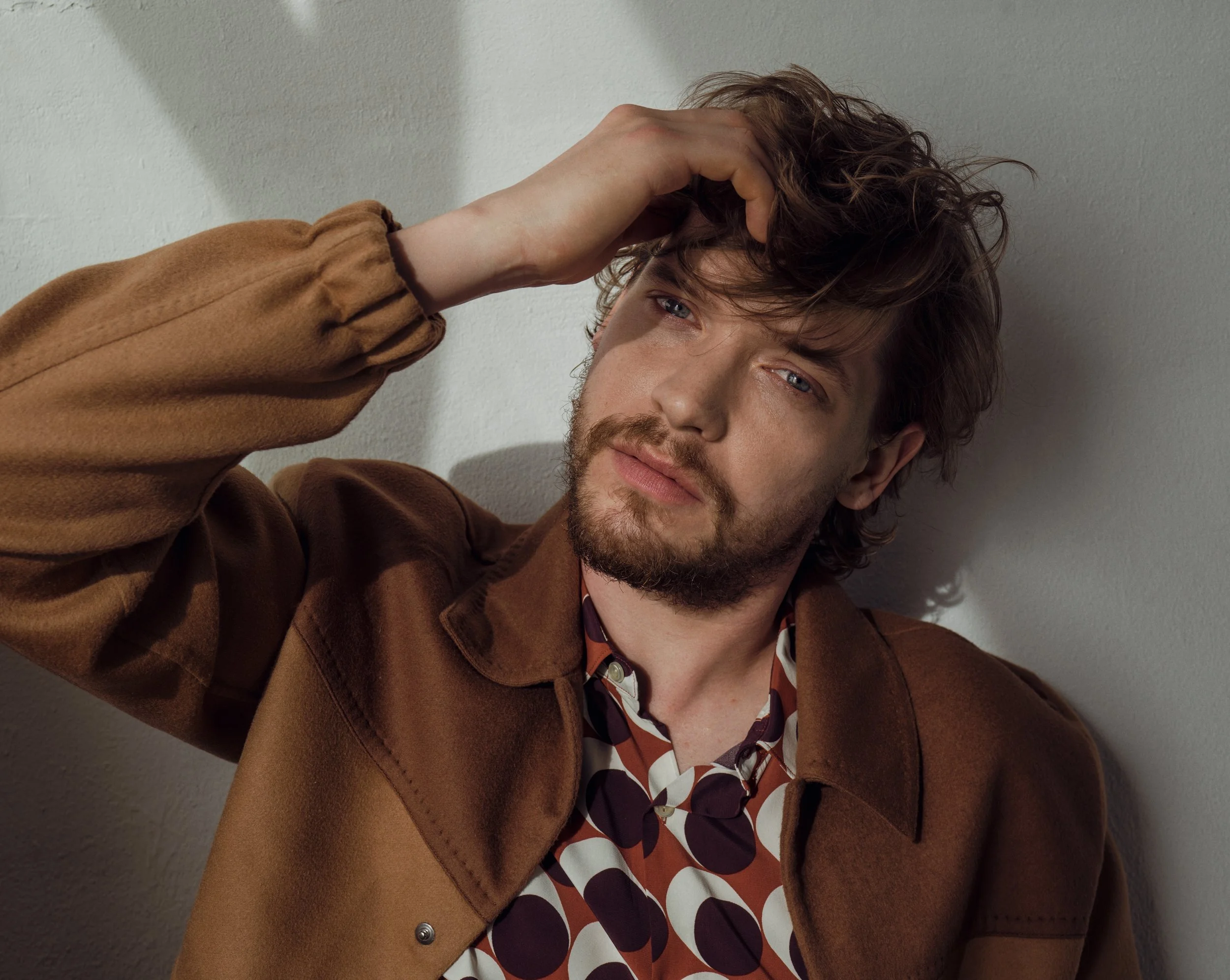Billy Howle | A Conversation with the 'Under the Banner of Heaven' Star
by Madeleine Schulz
BERLUTI jacket and SANDRO shirt.
Billy Howle has starred in many a hit, sharing the screen with the likes of Saoirse Ronan, Chirs Pine, and more. And this year, Howle stars alongside Daisy Edgar-Jones and Andrew Garfield in the crime drama series Under the Banner of Heaven. The Dustin Lance Black-created mini series for FX on Hulu, Under the Banner of Heaven is based on the nonfiction book of the same name about the murder of a Mormon mother and her infant daughter and a police detective’s discovery of the involvement of the Fundamentalist Church of Jesus Christ of Latter-day Saints. Howle makes his return to television as Allen Lafferty, a family member of the victims.
In addition to Under the Banner of Heaven, Howle will star as the lead in Infinite Storm, directed by Małgorzata Szumowska and Michał Engler, based on the article High Places: Footprints in the Snow Lead to an Emotional Rescue by Ty Gagne.
We caught up with Howle to discuss Under the Banner of Heaven, literature to screen adaptations, and more.
BERLUTI jacket, SANDRO shirt, and SAMSOE SAMSOE trousers.
Under the Banner of Heaven has just been released on Hulu. What was the most impactful part of filming this series for you as an actor?
That’s an interesting question. I suppose, and without being reductive about it, because I’m reluctant to be, I think it would be exploring someone’s crisis of faith. For the series overall, I would have to say Allen’s journey is probably the most impactful for me personally because that’s the one I spent the most time with. I think it will stick around for a long time to come and I think things sometimes send shockwaves that you are left with, especially when it’s someone’s real life.
Under the Banner is, of course, based on the non-fiction novel which details a real-life murder. What kind of pressure do you feel bringing a character whose story is based in reality to life, as opposed to a fictitious one?
Apart from the obvious, there’s something sacrosanct about people who have passed, as they’re sort of untouchable whether that’s a person you know or someone who should be forgotten, or whatever it is. Death kind of unites us in the sense that it is absolute. So, I feel like it’s very important to keep Brenda and Erica in mind, or it was for me anyway, and not just when playing Allen, but it is very important for telling the story as a whole, to keep them in mind for the duration. The real victims, apart from Brenda and Erica, are the people who survived—as they’re still living within those communities, with those memories. I never got to speak to them, but I would say there’s probably a fairly high chance that those people and communities will come across this piece of television that is inspired by a book about the death of these two people. I think it’s important to keep them in the forefront of our minds also, when telling this story and to do so sensitively. I think we’re in the hands of the writers and creators in that sense, but I trusted them, and I trust them now to have done that and to have done a lot of the work and research to make sure we do the story justice and honor the memory of Brenda and Erica and be respectful to those that survived them. There’s a lot of politics involved there too, so of course, it can be tricky and there are legality issues when you’re working on something that impacts the people that experienced this first hand, so it’s important not to be disrespectful. But I think in doing my part I wanted to do lots of research to make sure I knew enough about the story to tell it to the best of my ability.
How did you prepare for such a role?
Preparation comes in two parts. There’s the overall preparation which comes with any job I think and that’s predominately to do with characterization and understanding who that character is and the context. For me, it starts with reading the script over and over again and mining the script for things I might have missed, which also brings images and new ideas to mind. The more I read the script, the more my imagination comes alive really. I start to paint pictures and sometimes those images quite neatly cross-reference with what I’m faced with when I’m on set, in terms of location or the costumes I’m wearing, or even what the characters look like in the space. Then sometimes, oftentimes it doesn’t. Sometimes it’s a bit of a surprise so I have to remain flexible and be able to adapt while being as prepared as I possibly can. So it’s funny, I sort of sit between having some quite solid ideas about who I think Allen is and how he might behave, and say certain things. At the same time, there’s a level of fluidity that is necessary because in a way, and in a lot of other creative pursuits too, there’s a lot of negotiation that goes on, as it is a truly collaborative art form, so that has a lot to do with listening, making minor adjustments and remaining open and generous to other performers in the space. There’s things that they will need to do too but we all have the common goal of telling the story. Hopefully.
I worked with a dialect coach and started to look at, physiologically and psychologically what happens to Allen and what that trauma looks like, and how that affects the body, the voice, and the mind. There’s a technical side to the preparation too, such as breaking down the scripts and looking at language and that can become quite forensic sometimes. I sometimes have to stop myself from going too far down that rabbit hole. As I said, sometimes it can stop me from being flexible in the performance.
BERLUTI jacket and SANDRO shirt.
You’ve done many literature-to-screen adaptations, but Under the Banner was based on a book of investigative journalism. Your other recent project Infinite Storm was in a similar vein in that it was based on an article. Did you feel any major differences in these types of adaptations—between a piece of literature versus reportage?
Yes of course, well it’s funny because there seems to be a real trend – people at the moment are interested in the space ‘in-between’, I guess you could call it magical realism, and potentially preternatural happenings which happen in real spaces that are familiar to us and that we all recognize. There’s some of that in religion, some stories, allegorical or not, in the Bible require us to negotiate a contract between the written word and our sense of critical judgment. When something has happened historically, basically none of that stuff is there, and so the suspension of disbelief in a sense, operates differently to how it would if we knew, as a viewer or as a reader, that the piece is pure fiction. This is why documenting history is such a weighty responsibility. But then, the stories we tell also inform our morals and our judgments, so you might argue that fiction holds as hefty a duty. You could argue that there is no such thing as pure fiction, right? Because it all comes from somewhere and even if that is from the imagination of the writer, that imagination has been fuelled somehow by real experience or learning.
I think we’re reminded quite succinctly and easily that this really did take place and it happened to real people versus the literary adaptation. I guess the best way I can say this is, I think that sense of suspense or the ability to suspend that disbelief operates differently with pure fiction versus something that actually has happened and is based on historical fact.
Infinite Storm is a similar feat to Under the Banner in that it is a retelling of real events. However very little is actually known about your character, John (his name included). How did you handle the artistic license this afforded?
Again, I was aware that there was a high chance that whoever John is and wherever he is now that he might come across this story being made into a film. I don’t want to be presumptuous in speculating about what John might have to say about the film and about us trying to tell the story, however, I did want to be sensitive to what his thoughts might be. This is of course quite abstract, as I had no communication with him. I can’t go back in time and see what was truly happening to John and what led him to such a dangerous situation. So in a sense, because we were making a film, we had to afford a little bit of artistic license. I hope some of the decisions we made in making this film are something to do with John’s story and are something to do with what led him to that place. As I said, I can’t say what is true and what’s not but essentially, we decided to focus on the relationship between John and his savior and what that meant to them in that moment of crisis. In looking at it from this perspective, it meant we could touch on some bigger topics and bigger themes and I think there are some elements of that. We talk about grief and loss and how that manifests for different people and in different parts of their lives. We ask questions about how to deal with that and whether it gets any easier as you get older. It’s a resounding no, but there is some hope there in the film. The thing that brings them together is the companionship and it’s what human beings should be doing in a way. If there is a moral message, and it’s not my place to say I think Malgo would be the person to ask, but for me what I got from it is that we should all be looking out for each other.
BERLUTI jacket and SANDRO shirt.
Both of these projects seemed to be of fairly intense natures. What kinds of roles will you seek out next?
I think a lot of the roles I’ve played to date definitely have outwardly expressive emotions to them either because we find the character is in a moment of crisis or something like that, and let’s face it, that’s the backbone of drama. I was about to say I would love to do something more cerebral but some of the projects I’ve done have also been quite indie so in a way, I’m doing it still but there is talk and I feel I often come across quite serious and the people who know me or are closest to me know that I’m not that serious all the time and I’m not really intense. I can be really intense, sure but I have a capacity for humor somewhere. It’s funny because I don’t think that ever goes anywhere. People say you grow up with funny bones and they’re in there somewhere, still! I don’t know, I guess I should start looking for that part of my skeleton again.
Photographed by Joseph Sinclair
Styled by James Yardley
Groomer: Charlotte Fitzjohn
Styling assistant: Ollie Last




